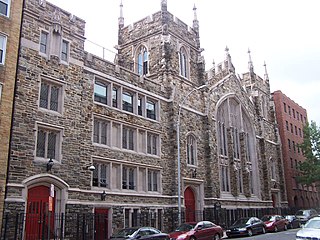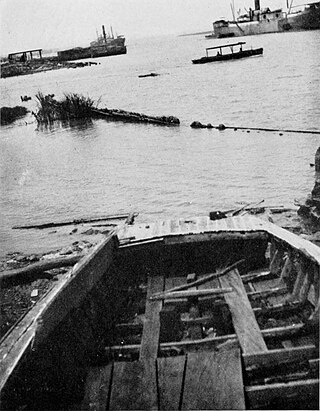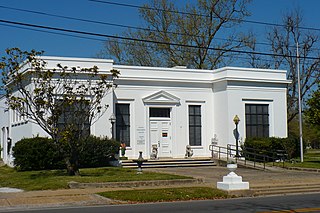
Charles City County is a county located in the U.S. commonwealth of Virginia. The county is situated southeast of Richmond and west of Jamestown. It is bounded on the south by the James River and on the east by the Chickahominy River.

William Still was an African-American abolitionist based in Philadelphia, Pennsylvania. He was a conductor of the Underground Railroad and was responsible for aiding and assisting at least 649 slaves to freedom towards North. Still was also a businessman, writer, historian and civil rights activist. Before the American Civil War, Still was chairman of the Vigilance Committee of the Pennsylvania Anti-Slavery Society, named the Vigilant Association of Philadelphia. He directly aided fugitive slaves and also kept records of the people served in order to help families reunite.

The Abyssinian Baptist Church is a Baptist megachurch located at 132 West 138th Street between Adam Clayton Powell Jr. Boulevard and Lenox Avenue in the Harlem neighborhood of Manhattan, New York City. It is affiliated with the National Baptist Convention, USA and American Baptist Churches USA.

The Black Seminoles, or Afro-Seminoles, are an ethnic group of mixed Native American and African origin associated with the Seminole people in Florida and Oklahoma. They are mostly blood descendants of the Seminole people, free Africans, and escaped former slaves, who allied with Seminole groups in Spanish Florida. Many have Seminole lineage, but due to the stigma of having mixed origin, they have all been categorized as slaves or freedmen in the past.
Black Indians are Native American people – defined as Native American due to being affiliated with Native American communities and being culturally Native American – who also have significant African American heritage.
Magruder is a surname. People with the surname include:

Lewis Woodson was an educator, minister, writer, and abolitionist. He was an early leader in the African Methodist Episcopal Church (AME) in Ohio and Pennsylvania. Woodson started and helped to build other institutions within the free African-American communities in Ohio and western Pennsylvania prior to the American Civil War.

Cudjoe Kazoola Lewis, born Oluale Kossola, and also known as Cudjo Lewis, was the third to last adult survivor of the Atlantic slave trade between Africa and the United States. Together with 115 other African captives, he was brought to the United States on board the ship Clotilda in 1860. The captives were landed in backwaters of the Mobile River near Mobile, Alabama, and hidden from authorities. The ship was scuttled to evade discovery, and remained undiscovered until May 2019.

The schooner Clotilda was the last known U.S. slave ship to bring captives from Africa to the United States, arriving at Mobile Bay, in autumn 1859 or on July 9, 1860, with 110 African men, women, and children. The ship was a two-masted schooner, 86 feet (26 m) long with a beam of 23 ft (7.0 m).

Africatown, also known as AfricaTown USA and Plateau, is a historic community located three miles (5 km) north of downtown Mobile, Alabama. It was formed by a group of 32 West Africans, who in 1860 were bought and transported against their will in the last known illegal shipment of slaves to the United States. The Atlantic slave trade had been banned since 1808, but 110 slaves held by the Kingdom of Dahomey were smuggled into Mobile on the Clotilda, which was burned and scuttled to try to conceal its illicit cargo. More than 30 of these people, believed to be ethnic Yoruba, Ewe, and Fon, founded and created their own community in what became Africatown. They retained their West African customs and language into the 1950s, while their children and some elders also learned English. Cudjo Kazoola Lewis, a founder of Africatown, lived until 1935 and was long thought to be the last survivor of the slaves from the Clotilda living in Africatown.
McGruder is a surname that refers to:
The family known in the media as the "black McCains" are the living descendants of Isom McCain and Leddie McCain, African-American slaves owned in Teoc, Mississippi, by William Alexander McCain, a cotton plantation owner who was the great-great-grandfather of Senator John McCain. The black McCains trace their surname to this slave ownership and neither claim nor disclaim blood relationship with Senator McCain. Among the black McCains, siblings Lillie McCain, of Detroit, and Charles McCain, Jr. and Mary Lou McCain Fluker, of Carrollton, Mississippi, are the living contemporaries of Senator McCain.

Basil Manly Sr. was an American planter, preacher and chaplain best known as the author of the Alabama Resolutions, which formed part of the argument for creation of the Southern Baptist Convention on proslavery grounds.
John Punch was an enslaved African who lived in the colony of Virginia. Thought to have been an indentured servant, Punch attempted to escape to Maryland and was sentenced in July 1640 by the Virginia Governor's Council to serve as a slave for the remainder of his life. Two European men who ran away with him received a lighter sentence of extended indentured servitude. For this reason, some historians consider John Punch the "first official slave in the English colonies," and his case as the "first legal sanctioning of lifelong slavery in the Chesapeake." Some historians also consider this to be one of the first legal distinctions between Europeans and Africans made in the colony, and a key milestone in the development of the institution of slavery in the United States.
The history of African Americans in Maryland is long and complex. Southern Maryland is the home of the first person of African descent to be elected to and serve in a legislature in America. His name was Mathias de Sousa and he was one of the original colonists to arrive in 1634. Southern Maryland is also the place where Josiah Henson was enslaved, and the place of brutality he wrote about in his later autobiography, which became the basis for Harriet Beecher Stowe's "Uncle Tom's Cabin".

African Americans in Alabama or Black Alabamians are residents of the state of Alabama who are of African American ancestry. They have a history in Alabama from the era of slavery through the Civil War, emancipation, the Reconstruction era, resurgence of white supremacy with the Ku Klux Klan and Jim Crow Laws, the Civil Right movement, into recent decades. According to the 2020 Census, approximately 25.8% of Alabama's population is African American.
African-American self-determination refers to efforts to secure self-determination for African-Americans and related peoples in North America. It often intersects with the historic Back-to-Africa movement and general Black separatism, but also manifests in present and historic demands for self-determination on North American soil, ranging from autonomy to independence. The freedom to make whatever choices as a free American, and willfulness to do for self are often a key demand for advocates of African-American self-determination.
Scipio Vaughan (1784–1840) was an African-American artisan and slave who inspired a "back to Africa" movement among some of his offspring to connect with their roots in Africa, specifically the Yoruba of West Africa in the early 19th century. After gaining his freedom, he spent the latter part of his life in the United States and started the movement with his immediate family members in his final moments. Several generations of Scipio's descendants are dispersed across three continents where they mostly live or lived, except for occasional cousin reunions, which includes people from Nigeria, Sierra Leone, Liberia, Ghana and Tanzania in Africa; Jamaica and Barbados in the Caribbean; the United States and Canada in North America; and the United Kingdom in Europe.

Abraham Redwood was a West Indies merchant, slave trader, plantation owner, and philanthropist from Newport, Rhode Island. He is the namesake of the Redwood Library and Anthenaeum, one of the oldest libraries in the United States. Redwood was the President of the Redwood Library and Anthenaeum from 1747 to 1788.
Elizabeth Grierson was an 19th-century Muscogee woman from the Hillabee town in the Muscogee Nation, now present-day Alabama.










